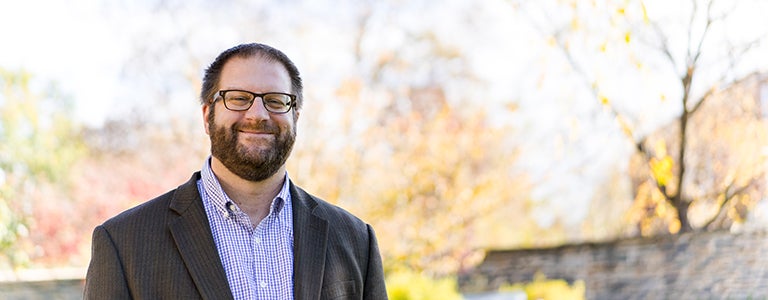A Look at the 2016 Campaign

Associate Professor of Government Hans Noel — Photo by Alex Hu.
January 26, 2016—As a political scientist, Georgetown College’s Associate Professor of Government Hans Noel is less interested in the minutia of presidential campaigns. But the 2016 campaign is giving him the opportunity to confirm what he has learned from studying the development of political parties over the past 200 years.
Noel’s research focuses on political parties and political ideology. In the book, The Party Decides, Noel and his coauthors traced presidential nominations from 1790 to 2008. “Typically the person with the most party support wins,” Noel explained. Although the American primary system allows any individual to enter the primaries and caucuses, the party leaders primarily influence who the nominee will be. This support can include public endorsements. But party leaders have other means to help candidates and influence outcomes, Noel says, such as steering the nomination away from alternatives, as the Republicans did for Mitt Romney in 2012.
The 2016 Democratic Primary has developed as Noel and his colleagues predicted. “On the Democratic side, it’s exactly what we thought, even more so than in 2008. I think [Hillary Clinton] has got it. There’s not a clear alternative as Obama was,” Noel continued.
Things are less clear for the Republican Party. “It’s not that it’s not at all what I thought, but every time it’s not quite what I expected. I think Trump is really fascinating,” Noel said. Although Donald Trump seems to have popular support, without backing from Republican leaders, Noel says, Trump is unlikely to win the nomination. “If he wins, then we’re wrong, and we learn something.”
According to Noel, Republican Party leaders already had a “hard decision for the party between Jeb Bush, Marco Rubio, and Scott Walker.” The popularity of “outsider” candidates like Trump and Ben Carson made their endorsement decisions even more difficult. “They’re not sure who the right choice should be. There’s a cleavage there, and the party is having a hard time uniting around it,” Noel continued. “Now, it may be too late.”
As a researcher of political parties, Noel insists that parties are much more important than the public might believe and often finds himself explaining why. “Parties are necessary because they are how we create democracy. Without them, what you get is chaotic cycling across different issues [and] no organized responsibility,” Noel explained. If each issue has its own “unique coalition,” voters are less able to hold public officials accountable.
“All that structure is necessary because it would happen behind the scenes. It would happen in a way that we [don’t] know, so it would not be transparent,” Noel explained. “We know what happens when there aren’t parties, and it’s not good things.”
For the 2016 campaign, party polarization has been a main theme in public commentary. Although there has been political polarization throughout American history, Noel believes current polarization is unique. “During previous periods of partisan polarization, the parties were not as ideologically cohesive as they are now. The reason that we’re polarized [now] is that the Republicans are largely a conservative party and the Democrats are largely a liberal party,” Noel explained.
In his second book, Political Parties and Political Ideology in America (2013), Noel examined the question of how political ideology has changed party structure.
“Ideology, for a variety of reasons, has become more structured. In the late 1800s, you did not have a liberal pole and a conservative pole. There was a progressive wing, and the progressives differed a great deal,” Noel explained. “Then we get our two poles, and those emerging in the early half of the 20th century. The problem was that they were not aligning with the Republican or Democratic parties.”
Although there were once conservatives and liberals in either party, that structure has largely disappeared. “It’s natural that the party system would align to it, but it took 70 years for the party system to respond to this organization. That’s going to be hard to break out of—short of major disruption.”
As the campaign moves into the voting stage, Noel is looking to see what the Republican endorsements will be and how (or if) the Republican Party will coordinate. “All of politics is about finding allies. Politics is a team sport; it’s not an individual enterprise,” Noel said. “At the end of the day, the people who coordinate win.”
Related Information
Associate Professor Hans Noel also writes for The Mischiefs of Faction, a political science blog devoted to American politics on Vox.com, and you can follow him on Twitter, @ProfHansNoel.
Professor Noel has created a list of his top five favorite books on politics for those interested in learning more about American politics. He is also working on a new book based on his article, Ten Things Political Scientists Know that You Don’t.
- Tagged
- Faculty